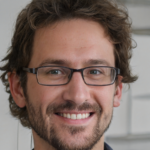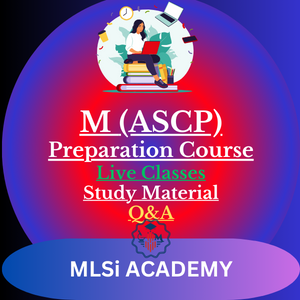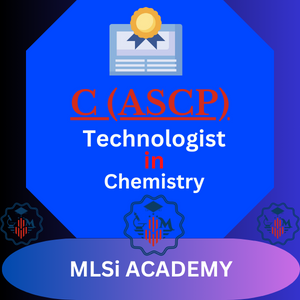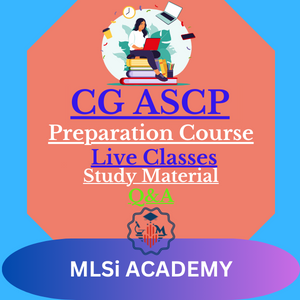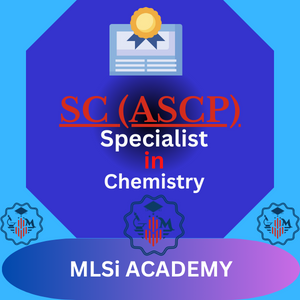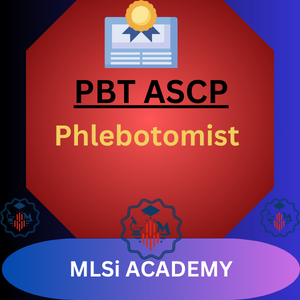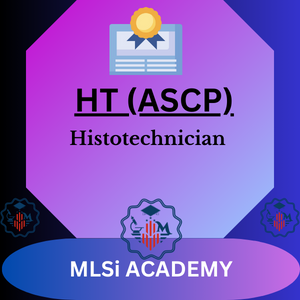ASCP Certification – American Society for Clinical Pathology Certification Guide to BOC Exams
The American Society for Clinical Pathology (ASCP) Board of Certification (BOC) offers authentic and recognized certificates across various fields of medical laboratory science.
Watch: ASCP Certification – American Society for Clinical Pathology Complete Guide To BOC Exams Video
Here’s a quick video explaining each ASCP certification, its routes, and exam qualifications. If you prefer watching, start here!
These certificates are divided based on the candidate’s location: ASCP for U.S.-based professionals and ASCPi for international candidates. They are also categorized by discipline, such as molecular biology, chemistry, microbiology, hematology, blood bank, cytology, and histotechnology. Additionally, based on the certificate level, they can be classified as ASCP medical laboratory scientist, technologist, specialist, or technician.
In this guide, we’ll look at the core details of ASCP certifications, including content area, eligibility requirements, and ASCP preparation.
What Is ASCP Certification?
ASCP stands for the American Society for Clinical Pathology. They certify and support specialists who work in medical labs. Their certification proves you meet specific education and experience requirements and pass an exam. That exam checks your skills in areas such as hematology, microbiology, and clinical chemistry.
An ASCP credential shows employers that you can handle patient specimens and lab procedures. It often leads to better job options and higher wages. They also provide ongoing education so you can keep your credentials valid.
Note: U.S.-based professionals earn the ASCP credential, while international candidates pursue the ASCPi version.
What’s the Difference Between ASCP and ASCPi?
The main difference comes down to where you're applying from.
- ASCP certification is for candidates who have earned their degree in the United States and meet U.S.-based training or experience requirements.
- ASCPi stands for “International,” and it's designed for medical lab professionals who earned their education or work experience outside the U.S.
Both versions are issued by the same organization, the ASCP Board of Certification (BOC), and the exam content is the same. The only real difference is the eligibility process.
If your degree wasn’t earned in the U.S., you'll need to get a U.S. equivalency evaluation from an agency approved by ASCP before you apply under the ASCPi route.
Once certified, both ASCP and ASCPi professionals are recognized globally. The credential shows that you meet international standards in medical lab science.
ASCP Certification Types by Certificate Level
American Society for Clinical Pathology certifications can be categorized into four types based on the prerequisites and level of professionality:
- Medical Laboratory Scientist
- Medical Laboratory Technologist
- Medical laboratory Technician
- Medical Laboratory Specialist
Each certification is tailored to the candidate’s education, training, and level of hands-on experience. The following sections will cover the requirements, exam content, and application guidelines for each certification type in detail.
MLS ASCP Certification
MLS ASCP conducts a wide variety of tests, from simple to complex. They perform all necessary tests that are essential for the diagnosis and treatment of diseases.
To become MLS ASCP certified, you must have strong knowledge of immunology, microbiology, urinalysis and other body fluids, blood banking, hematology, chemistry, and laboratory operations.
To apply for the MLS exam, you must have a baccalaureate degree and a few years of clinical experience in chemistry, immunology, blood banking, and other relevant subjects.
American Society for Clinical Pathology Technologist Certification
ASCP Board of Certification (BOC) grants nine certificates for medical laboratory technologists. These include:
- MB ASCP – Molecular Biology
- M ASCP – Microbiology
- C ASCP – Chemistry
- H ASCP – Hematology
- BB ASCP – Blood Banking
- CG ASCP – Cytogenetics
- CT ASCP – Cytology
- HTL ASCP – Histotechnologist
- CTgyn ASCPi – International Gynecologic Cytologist
Each certification focuses on a specialized area of laboratory science and has its own eligibility criteria, exam content areas, and experience requirements. In the following sections, we’ll discuss each certification and what you need to qualify for it.
1. MB ASCP Certification (Technologist in Molecular Biology)
Molecular biology technologist detects acquired and inherited disorders, including malignant, metabolic, and infectious diseases, with molecular diagnostic techniques.
The ASCP BOC checks your skill in molecular techniques and testing with lab operations before giving you an MB ASCP certificate.
To be eligible, you need a baccalaureate degree in a related field and clinical laboratory experience in molecular diagnostics, completed within the timeframe set by the ASCP BOC.
2. M ASCP Certification (Technologist in Microbiology)
Technologists in microbiology deal with microscopic organisms, including bacteria, moulds, parasites and viruses to identify infectious diseases.
To get the M (ASCP) certificate, you must have knowledge of lab operations for maintaining all processes and analytic and preanalytic procedures, including bacteriology, mycobacteriology, virology and parasitology.
A baccalaureate degree in relevant subjects is an important requirement for all BOC routes. To be eligible, you must have clinical laboratory experience or have completed the Medical Lab Scientist Program offered by NAACLS.
3. C ASCP Certification (Technologist in Chemistry)
A chemistry technologist is responsible for determining chemical and hormonal contents in blood and other body fluids. They perform a variety of tests.
You must demonstrate your skill and knowledge in electrolytes, blood gases, lab operations, and other related content areas.
A baccalaureate degree and lab experience in the recommended procedures are essential within the given timeframe to qualify for the C ASCP exam.
4. H ASCP Certification (Technologist in Hematology)
Technologists in hematology play an important role in the analysis of body fluids, including blood, to identify hematologic and coagulation disorders. They figure out the best result for the diagnosis and treatment of diseases.
Hematology disease states, physiology, laboratory testing, hemostasis, and lab work are exam content areas for the H (ASCP) exam.
Clinical laboratory experience in all required procedures and a baccalaureate degree are prerequisites for the exam.
5. BB ASCP Certification (Technologist in Blood Banking)
Blood banking Technologists perform many tests to identify antibodies and determine blood types.
The American Society for Clinical Pathology Board of Certification awards this BB certificate by monitoring candidates' experiences in blood group systems, lab work, transfusion practice, blood products, and serologic and molecular testing.
A baccalaureate degree, lab experience in different procedures, and a few years of clinical experience in blood banking are essential eligibility requirements to apply for this exam.
6. CG ASCP Certification (Technologist in Cytogenetics)
Cytogenetics technologists apply various techniques to the diagnosis and treatment of acquired and inherited diseases. They prepare slides for the analysis of samples.
You must be an expert in chromosome analysis, laboratory operations, and specimen preparation to get this certificate.
A baccalaureate degree and one or more years of clinical experience in cytogenetics within the given time frame are requirements for the CG (ASCP) exam.
7. CT ASCP Certification (Technologist in Cytology)
A cytologist follows the directions of pathologists to detect infectious agents, pre-cancerous changes, inflammatory processes, and cancer in the lab.
You must know all about non-gynecological cytology, lab work, gynecological cytology, and fine needle aspiration.
As a U.S. candidate, you only need a baccalaureate degree and a CAAHEP-accredited cytotechnology program. However, as an international candidate, you need a baccalaureate degree and clinical experience in relevant proceduresfor CT certification exam .
8. HTL ASCP Certification (Histotechnologist)
Histotechnologists perform many complicated tasks, including in-situ hybridization, immunohistochemistry, and immunofluorescence on tissue samples to diagnose disease.
A baccalaureate degree in biology and chemistry and lab experience in many procedures in the recommended time frame are prequalifying requirements for the exam.
9. CTgyn ASCPi Certificate(International Gynecologic Cytologist)
A gynecologic cytologist (CTgyn) is responsible for detecting benign tumors, pre-cancerous changes, inflammatory processes, and cancer by performing multiple tests.
You must have enough knowledge to prove yourself in lab work, biological behaviors, physiology, normal cellular morphology, and cytopathology.
A diploma in the relevant field, CT (IAC) certification, and lab experience in gynecologic cytology are essential for CTgyn ASCPi routes.
American Society for Clinical Pathology Specialist Certification
Specialist certifications from the ASCP BOC are considered the most advanced credentials available in laboratory science. These certifications are ideal for experienced professionals who want to demonstrate deeper expertise in their specific discipline.
The ASCP offers the following specialist-level certifications:
- SM ASCP – Specialist in Microbiology
- SMB ASCP – Specialist in Molecular Biology
- SC ASCP – Specialist in Chemistry
- SH ASCP – Specialist in Hematology
- SBB ASCP – Specialist in Blood Banking
- SCT ASCP – Specialist in Cytology
- SCYM ASCP – Specialist in Cytometry
Each specialist certification has unique eligibility requirements that typically include an existing technologist-level certification (like MLS or MB), an advanced degree, and several years of clinical or teaching experience in the chosen field.
1. SM ASCP Certification (Specialist in Microbiology)
Specialists in microbiology identify infectious diseases by detecting bacteria, viruses, parasites, and molds in body fluids and tissue samples.
Candidates with knowledge in parasitology, mycology, mycobacteriology, and lab operations are well-suited for the SM certification.
To earn this certificate, you must meet specific requirements, including a doctorate, baccalaureate, or master’s degree in a relevant subject, a valid M (ASCP) or MLS (ASCP) certification, and teaching or lab experience in the recommended procedures.
2. SMB ASCP Certification (Specialist in Molecular Biology)
Molecular biology specialists identify inherited and acquired diseases, including metabolic, malignant, and infectious conditions, using molecular diagnostic methods.
The American Society for Clinical Pathology BOC awards the SMB certification to lab specialists who demonstrate expertise in molecular science, molecular techniques, clinical applications of molecular testing, and laboratory operations.
Eligibility requires a valid MB (ASCP) certification, a baccalaureate, master’s degree, or doctorate in a relevant field, and clinical experience in molecular biology.
3. SC ASCP Certification (Specialist in Chemistry)
A chemistry specialist performs multiple tests to analyze hormonal and chemical content in blood and other body fluids to help physicians in diagnosing and treating diseases.
To earn the SC (ASCP) certification, you must have knowledge in general chemistry, lab operations, electrolytes, acid-base balance, blood gases, enzymes, and proteins, all of which are part of the exam syllabus.
Eligibility requires a valid C or MLS (ASCP) certification, a baccalaureate degree, and up to three years of clinical experience.
1. SH ASCP Certification (Specialist in Hematology)
A hematology specialist identifies coagulation and hematologic abnormalities by performing experiments on all body fluids.
This certificate is for lab professionals who possess skills in the areas of lab work, hematology, physiology, disease state, hemostasis, etc.
To get the SH specialist certification, you must hold a valid H (ASCP) or MLS (ASCP) certification, have a baccalaureate degree, and possess teaching or laboratory experience in clinical hematology as outlined by the ASCP BOC.
2. SBB ASCP Certification (Specialist in Blood Banking)
Specialists in Blood banking perform many tests to identify antibodies and determine blood types.
BOC assesses candidates' knowledge in blood group systems, lab work, transfusion practice, blood products, and serologic and molecular testing.
Valid BB or MLS (ASCP) certification, a baccalaureate degree or master's degree in relevant subjects, and a few years of clinical lab experience are required for the SBB certification exam.
3. SCT ASCP Certification (Specialist in Cytology)
A specialist in cytology analyzes the body’s cellular specimens, including those collected through bronchoscopic and endoscopic ultrasound-guided fine needle aspirations, fluorescence in-situ hybridization (FISH), and rapid on-site evaluation (ROSE) of needle aspirates.
The American Society for Clinical Pathology BOC awards this certification to lab professionals who demonstrate expertise in gynecological cytology, fine needle and other aspirations, non-gynecological cytology, and laboratory operations.
Eligibility for the SCT ASCP exam requires valid CT (ASCP) certification, a baccalaureate or master’s degree in a relevant subject, and one or more years of laboratory experience.
4. CYM ASCP Certification (Specialist in Cytometry)
Specialists in cytometry are experienced laboratory professionals with in-depth knowledge of all aspects of flow cytometry, including technical procedures, data analysis, quality assurance, and regulatory standards.
To earn the SCYM (ASCP) certification, you must demonstrate strong proficiency in experimental panel design, instrumentation, applications, lab operations, and data interpretation.
To be eligible, you need a valid ASCP technologist or specialist certification, a baccalaureate, master’s, or doctoral degree in a related field, and several years of clinical laboratory experience in flow cytometry
American Society for Clinical Pathology Technician Certification
The ASCP Board of Certification also offers technician-level credentials for entry- and mid-level lab professionals. These certifications validate core laboratory skills and are ideal for individuals who perform specimen collection, sample processing, and routine testing in clinical settings.
The technician certifications include:
- MLT ASCP – Medical Laboratory Technician
- PBT ASCP – Phlebotomy Technician
- HT ASCP – Histotechnician
- MLA ASCP – Medical Laboratory Assistant
Each credential has its own eligibility criteria, usually involving an associate degree, specialized training, or a combination of education and hands-on experience. The next sections provide detailed overviews of each certification.
1. MLT ASCP Certification (Medical Laboratory Technician)
A medical laboratory technician provides vital diagnostic information by performing a range of tests that support disease detection and treatment.
Key content areas for the MLT ASCP certification include chemistry, microbiology, immunology, blood banking, body fluids, and laboratory operations.
To qualify, you must have an associate degree, completion of a military medical lab training course, or acceptable clinical experience in relevant subjects that meet the application requirements.
2. PBT ASCP Certification (Phlebotomy Technician)
Phlebotomy technicians work directly with patients to collect, process, and transport blood and other specimens for laboratory testing.
The American Society for Clinical Pathology BOC awards the PBT certification to candidates who demonstrate strong knowledge of infection control and laboratory safety.
A high school diploma or equivalent, along with completion of a NAACLS-accredited phlebotomy program, are common requirements across the eligibility routes recommended by the BOC.
3. HT ASCP Certification (Histotechnician)
Histotechnicians use histologic techniques such as fixation, processing, and staining to prepare tissue samples for microscopic examination.
The American Society for Clinical Pathology BOC certifies candidates who demonstrate strong knowledge in tissue processing, staining methods, laboratory operations, and fixation procedures.
HT ASCP applicants must meet specific application requirements, including completion of a NAACLS-accredited histotechnician program and academic credit in biology and chemistry within the required semester hours.
4. MLA ASCP Certification (Medical Laboratory Assistant)
Medical laboratory assistants perform a variety of tasks, including collecting samples, registering patients, and assessing the samples for lab tests.
To become MLA (ASCP) certified, applicants must be knowledgeable in specimen processing and preparation, point-of-care testing, lab procedures, and patient registration.
A high school diploma or equivalent, valid PBT (ASCP) certification, or completion of a NAACLS-accredited Medical Laboratory Assistant (MLA) program along with clinical experience are the typical application requirements for this exam.
ASCP Certification Types by Discipline
ASCP certifications can also be grouped based on discipline or specialty area. Each discipline focuses on a distinct branch of laboratory science, allowing professionals to specialize in the areas where they are most skilled or experienced.
The main ASCP certification disciplines include:
- Molecular Biology
- Microbiology
- Chemistry
- Hematology
- Blood Banking
- Cytology
- Histology
- Cytometry
Each of these areas offers both technologist- and specialist-level certifications (where applicable). The following sections explain what each discipline involves and what it takes to earn the corresponding certification.
1. ASCP Molecular Biology (MB & SMB Certifications)
ASCP molecular biology certifications are for both technologists and specialists, recognizing their knowledge and skills in this field.
The MB certification is for technologists, while SMB is for specialists.
Specialists are expected to have more advanced knowledge of molecular testing methods and their clinical applications. To qualify for the SMB certification, candidates may need to hold a valid MB (ASCP) credential.
2. ASCP Microbiology (M & SM Certifications)
ASCP microbiology certifications include M (ASCP) for technologists and SM (ASCP) for specialists in microbiology.
Both roles support physicians in diagnosing and treating infectious diseases. However, specialists typically act as consultants or advisers in their area of expertise.
To meet SM eligibility requirements, you may need to hold valid M (ASCP) or MLS (ASCP) certification.
3. ASCP Chemistry (C & SC Certifications)
Both technologists and specialists in ASCP chemistry analyze body fluids to determine the chemical or hormonal content of each specimen.
C (ASCP) is for technologists, while SC (ASCP) is for specialists in chemistry. SC-certified professionals typically have more experience performing complex lab tests than technologists.
MLS or C (ASCP) certification is commonly required across most eligibility routes for the SC ASCP exam.
3. ASCP Hematology (H & SH Certifications)
Both H (ASCP) and SH (ASCP) certified professionals analyze body fluids to support physicians in diagnosing and treating various diseases.
The American Society for Clinical Pathology awards the H credential to technologists and SH to specialists in hematology.
While both perform similar tasks, SH-certified professionals bring more advanced skills and expertise.
To qualify for the SH exam, you may need a valid MLS or H (ASCP) certification.
5. ASCP Blood Bank (BB & SBB Certifications)
BB and SBB are ASCP credentials in blood banking. BB is for technologists, while SBB is for specialists.
Both roles involve selecting blood components, identifying antibodies, and determining blood types. However, specialists often take on leadership roles and serve as laboratory managers.
To apply for the SBB certification, you typically need a valid BB or MLS (ASCP) credential or a master’s degree in a related field.
6. ASCP Cytology (CT & SCT Certifications)
The American Society for Clinical Pathology offers cytology certifications for both technologists and specialists: CT (ASCP) for technologists and SCT (ASCP) for specialists.
Both are responsible for collecting cellular samples from the body and analyzing them to detect disease, including cancer and pre-cancerous changes.
Specialists use more advanced techniques for greater diagnostic accuracy. To qualify for the SCT exam, you may need a valid CT (ASCP) credential or a master’s degree.
7. ASCP Histology (HT & HTL Certifications)
The American Society for Clinical Pathology histology certification is available only for technologists. Histotechnologists follow the instructions of pathologists to perform simple to complex tests that support the diagnosis and treatment of disease.
They are responsible for processing tissue samples and preparing slides for microscopic examination to help identify disease states and guide care.
A baccalaureate degree in biology or chemistry is typically required for eligibility under all BOC routes.
8. ASCP Cytometry Certification (SCYM ASCP Certification)
The American Society for Clinical Pathology certification in cytometry is available only for specialists. A cytometry specialist has advanced knowledge of all aspects of flow cytometry and can perform assays in reference, clinical, and research laboratories.
To earn this certification, candidates must have strong knowledge of instrumentation, clinical applications, and lab operations.
A baccalaureate degree and at least one year of clinical experience in flow cytometry are standard eligibility requirements across all routes.
How to Get ASCP Certified?
Earning your ASCP or ASCPi certification takes preparation and attention to detail but the process is straightforward if you know the steps.
1. Select the Right Certificate
Start by identifying the certificate that matches your education, experience, and career goals. ASCP offers credentials for technicians, technologists, specialists, and laboratory scientists across multiple disciplines.
2. Check Eligibility Requirements
Each certification has specific eligibility routes. Review the requirements carefully to confirm that your academic background and clinical experience meet ASCP BOC criteria.
3. Prepare Required Documents
Collect the necessary documents, which may include transcripts, training or experience verification, and foreign degree evaluations (for ASCPi applicants).
4. Create an ASCP Account
Visit the official ASCP website and create an account. Make sure to enter your information accurately, as this will be used for all application steps.
5. Submit Your Application
Complete the online application and upload all required documents. Double-check your entries and provide a valid email address for correspondence from ASCP.
6. Application Review Process
ASCP BOC takes up to 45 days to review your application. During this time, ensure all required documents are submitted. Missing information may delay or disqualify your application.
7. Exam Preparation Steps
Use the ASCP-recommended reading list or opt for a structured prep program like MLSi Academy’s 4×4 course. This can save time and help you study smarter with live classes, guided materials, and exam-style questions.
Frequently Asked Question
What does BOC ASCP stand for?
BOC stands for Board of Certification, and ASCP stands for the American Society for Clinical Pathology. Together, BOC ASCP refers to the organization that certifies medical laboratory professionals in the U.S. and internationally.
What are the benefits of getting ASCP certification?
ASCP certification strengthens your credibility, improves job prospects, and can lead to higher salaries. It’s widely recognized in the U.S., the Middle East, Europe, and other global healthcare markets. Explore the full range of ASCP certification benefits, from career growth to professional recognition.
What is the highest possible score on the ASCP exams?
The ASCP BOC exam uses a scaled scoring system from 0 to 999. The passing score is 400. While scores can vary by section, anything above 400 is considered a pass. There’s no public record of a maximum score achieved.

Abdelhalim Elshawadfy is an ASCP certified Medical Laboratory Scientist (MLS ASCP), Specialist in Microbiology (SM ASCP), and Molecular Biology Technologist (MB ASCP) with a distinguished career marked by expertise, continuous learning, and a commitment to elevating the standards of clinical laboratory science. As an ASCP Certification Expert and American Board Certification Expert, Abdelhalim Elshawadfy continues to make invaluable contributions to the field, leaving a lasting impact on the medical community.






